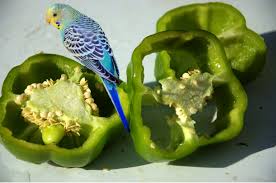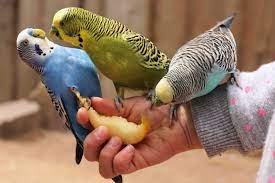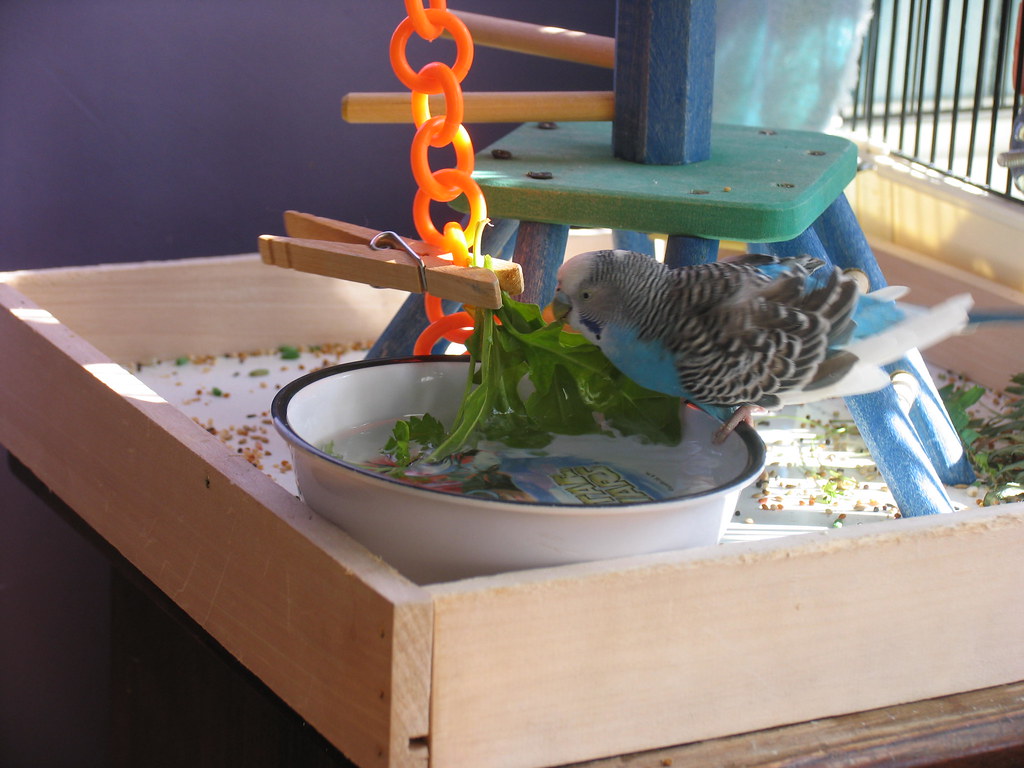Diet/Health
Food
Seeds can facilitate bacterial growth, can be fattening, and lack nutrients. Instead, it is recommended to feed your budgie pellets. Poor nutrition is a very common cause of bird health issues, most notably obesity and iodine deficiencies in budgies. You may encounter molting season, song, and conditioning seed blends, which are just as equally nutritionally incomplete. In order for your bird to improve in these areas, feed it a healthy diet all year.
If your bird already eats primarily seed, slowly incorporate pellets into its diet by mixing it with seed and gradually increasing the amount of pellets.
A budgie does not eat ONLY seeds and/or pellets; they do not contain all the nutrients budgies need. Even if you make the healthier switch to pellets, it still does not replace the nutritional value of fruits and vegetables. Always remember to wash the fruits and veggies, even if they are organic. If your bird ignores other foods and prefers one in particular, offer less of it to promote a varied diet. Don’t leave them in your budgie’s cage for more than a couple hours, especially when it’s hot, or they’ll go bad and that can make your bird sick. If your bird doesn’t seem to like a food, you can still convince them to try it.
Examples of budgie-safe foods:
- Apple
- Peaches
- Apricots
- Dates
- Plum
- Fig
- Mango
- Nectarine
- Papaya
- Tomato
- Banana
- Coconut
- Pomegranate
- Grapefruit
- Orange
- Kiwi
- Pineapple
- Berries (Raspberry, Blueberry, strawberry, banana, cherries with no pit, grapes)
- Melons (Cantaloupe, Watermelon, Honeydew)
- Leaft greens (Bok CHoy, Kale, Romaine Lettuce, Dandelion Leaves, Cabbage, Spinach)
- Pear asparagus
- Peas
- Corn
- Brussel sprouts
- Cucumber
- Zucchini
- Broccoli
- Cooked Beans (Lima, Kidney, chickpea)
- Lentils
- Potato
- Sweet Potato
- Carrot and carrot tops
- Endive
- Beet
- Parsnip
- Squash/gourds (Pumpkin, squash)
- Soybean
- Brown Rice
- Sprouted seeds

In general, if it’s healthy for humans, it’s probably good for birds (Of course, with some exceptions below) A portion the size of a thumbnail is the bird equivalent of a dinner plate. Some budgies might occasionally like cooked egg, lean cooked meat, fish, or small amounts of cheese.
Examples of unsafe foods:
- Avocado
- Eggplant
- Apple Pips
- Rhubarb
- Tomato plant leaves
- Potato plant leaves
- Caffeine
- Chocolate
- Alcohol
- Onion
- Garlic
- Junk food
- Excessive salt
- Excessive fat
- Most fruit pits
- Xyliyol (common aftificial sweetener)

Budgies do not need gravel or grit to digest their food; only pigeons do. Budgies can actually develop stomach issues if they eat too much, so the cons heavily outweigh the pros. Do not give your budgie grit.
Budgies and most parrots need an extra source of calcium. A good, common way to provide it is through cuttlebone clipped to their cage, which can also keep a bird’s beak from getting too long. Some owners opt instead for liquid calcium supplements.
Spray millet, a type of grain commonly sold on a stalk, can be given as a treat, but don’t feed it to your bird too often or it will get fat. Keep it in your budgie’s cage at times or use it in training.
Hygiene
Most parrots love baths, albeit some in different ways than others. Your budgie should receive a bath every day to keep itself clean.
Some ways to give your bird a bath include:
- Spray Mister
- Faucet
- Shower
- Bird Fountain
- STill Water Bowl

DO NOT bathe your budgie in any sort of deep water, as budgies cannot swim and might drown. Keep their baths shallow with lukewarm water.
Every week, you should deep clean your bird’s cage by washing it with soap and water, scrubbing any toys and perches as well. Every day, change the newspaper under the cage and clean your bird’s food and water dishes with soap and water to prevent bacterial buildup.
Sickness
Monitor your bird’s eating behaviors and patterns, to see which foods they like and if they’re eating a healthy amount. Take them to the vet each year for a checkup, and ask the vet any questions you have about bird care.
sources: